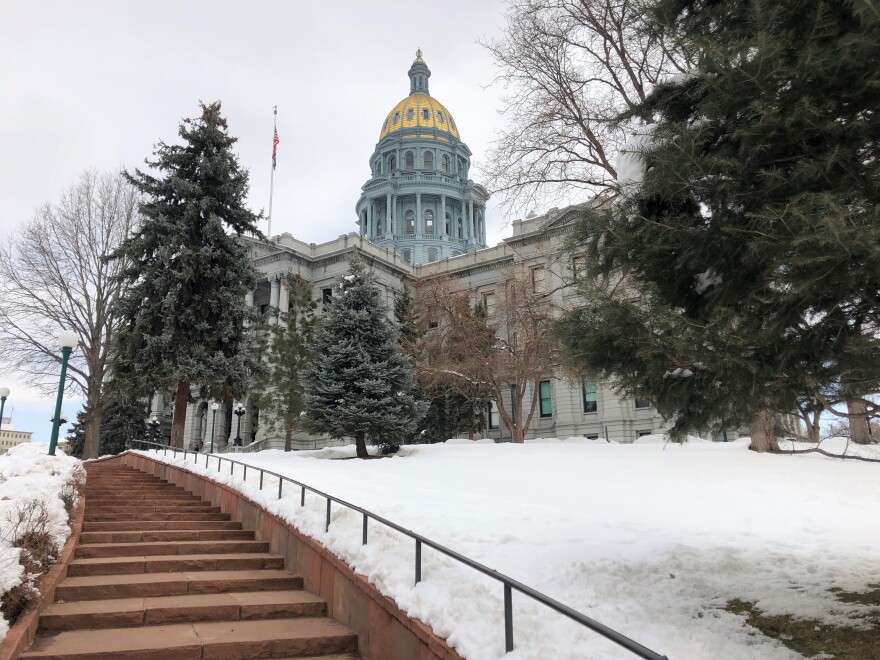The latest version boils down to an ultimatum to the health care industry: Bring insurance prices down by 20% by 2024 – or the government will step in with its own plan to compete.
The 10-hour debates and lobbyist-filled hallways are signs things are returning to normal at the state Capitol. And that has some lawmakers reviving bills they shelved because of the pandemic.
One such bill aims to lower costs for those who buy insurance on the individual market because they cannot get it through an employer.
Rep. Dylan Roberts, D-Avon, is sponsoring the bill because he continues to shoulder an unflattering statistic at the state Capitol.
“The two counties that I represent, Eagle and Routt, there is only one option on the health insurance market for those who buy on the individual market,” he said. “And those premiums are some of the highest, not only in our state, but in our country.”
This is the third time in three years Roberts has sponsored a bill trying to advance a so-called public health insurance option.
He says such a plan would put limits to how much hospitals can charge and boost the amount of money that insurance companies must spend on a consumers’ actual care.
It would also require pharmaceutical companies to pass rebates all the way down to the customers.
And, Roberts says, adding a government-controlled plan could lower premiums by as much as 18%. There was momentum to pass it last year. But hospitals and insurance companies blasted the proposal, saying it would destabilize the market.
Then the pandemic hit, and it became politically impossible for Roberts and others to engage in a legislative battle with a health care industry that needed to respond to a deadly virus.
“And so, we went back to the drawing board and made some significant changes that actually make me feel more confident and excited about what what's coming forward,” he said.
The latest version boils down to an ultimatum to the health care industry: Bring insurance prices down by 20% by 2024 – or the government will step in with its own plan to compete.
“So that will drive everybody in the health care industry, I believe, to the table,” Roberts said.
But two and a half years is a long time, and Roberts’ constituents are paying a steep price while they wait.
Freelance journalist Dave Williams, who writes for a website called RealVail.com, has only one option to choose from when he goes to purchase insurance on the individual market in Eagle County. He says he pays $20,000 a year for it.
“And the deductibles on these plans are terrible,” he said. “We don’t start getting the benefit until we pay $65,000. So hopefully the insurance industry understands the situation and really works hard to bring down costs with the providers to get the costs down.”
But groups tied to the health care industry started blasting the latest public option bill before it was introduced. TV advertisements claiming it would “threaten” coverage and increase costs have been airing around Colorado.
“These oversimplified ads… do not help the situation, because what needs to really happen is lawmakers, the health insurance providers, and the health care providers all need to get on the same page here, and really start resolving this issue,” Williams said.
Advocates of a public option say the COVID-19 pandemic has also made the issue more critical.
“Thousands of Coloradans have lost their jobs, and along with the job loss, they’ve lost their employer provided health insurance,” Kristen Nordenholz, an emergency medicine physician in Denver, said this month. “Nobody should have to choose between seeing a doctor, putting food on the table, or getting their medications.”
But the bill is getting a cold reception from Front Range business groups. Leaders of the Denver Metro Chamber say it could shift the cost from the individual market to the majority of Coloradans who get it from their employers.
“Such a policy is most likely to result in premium reductions for the 7% of Coloradans who buy coverage through the individual market, while burdening the 52.7% who buy coverage through their employer-sponsored plans and the 6.5% of uninsured Coloradans who pay out-of-pocket for services,” the chamber wrote in a letter to Roberts.
They also said the pandemic makes a public option more risky.
“The pandemic has highlighted just how fragile our health care infrastructure is,” they wrote. “Now is not the time to experiment with risky new approaches that could further destabilize health care providers, particularly rural hospitals and private practice providers.”
The chamber declined an interview request for this story. Meanwhile, Roberts says he’s pressing on despite the concerns.
“I've heard and read from some people who say that now is not the time for bold, necessary reforms like this bill,” he said. “And all I'll say is that those individuals have not spent enough time with the constituents that we represent who are paying some of the highest premiums in the state and making decisions right now as to whether they should go another year without the health security of health insurance or not.”
Meanwhile, freelancer Dave Williams says Eagle County residents continue to face elevated premiums, or risk going bankrupt if they go without insurance and get sick or injured.
“It’s really stifling people who are self-employed, which is a lot of us up here, it’s stifling small business,” he said.
Previous versions of the public option bill had some Republican co-sponsors. But only Democrats are leading the effort on the latest version.
Lawmakers are scheduled to start debatingthe public option bill on Wednesday.
Copyright 2021 KUNC. To see more, visit KUNC.9(MDEyNDE4NDgyMDEzODIwMjkwMTE0MzcxYg001))



